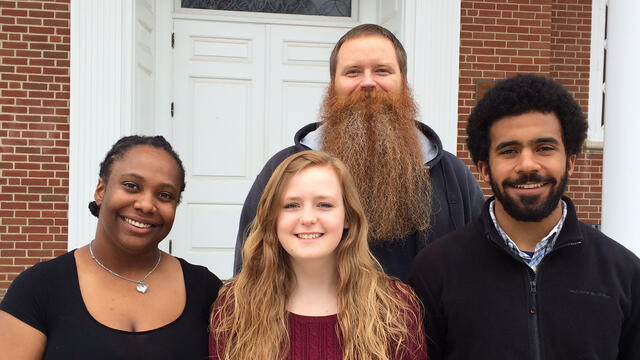Students present panel on religion and race at academic conference
Weaving their papers together with the common thread of religion and race, three McDaniel students created and recently presented a panel at the regional meeting of the American Academy of Religion in New Jersey.

Sijui Kama Bartrum, Jacob Bickely and Angel Petty represented McDaniel at the academic gathering showcasing their research papers on convict leasing in Louisiana, the nation of Yahweh and Jonestown People’s Temple, respectively, in a panel format with a formal response by Religious Studies professor Brad Stoddard.
Weaving their papers together with the common thread of religion and race, three McDaniel students created and recently presented a panel at the regional meeting of the American Academy of Religion in New Jersey.
Sijui Kama Bartrum, Jacob Bickely and Angel Petty represented McDaniel at the academic gathering showcasing their research papers on convict leasing in Louisiana, the nation of Yahweh and Jonestown People’s Temple, respectively, in a panel format with a formal response by Religious Studies professor Brad Stoddard.
Until she enrolled in Stoddard’s African American Religious History class, Bartrum knew nothing about the practice of convict leasing, which began after the Civil War and was ended in 1921.
“Religious institutions continued slavery through convict leasing — Slavery 2.0 is the most academic way of saying it,” says Bartrum, a senior Political Science American Studies major from Silver Spring, Md., who focused her research on convict leasing in Louisiana. “African Americans, often arrested for petty crimes, were sent to chapel to subdue them and then were leased out to plantations and other places as labor.”
Nation of Yahweh founder Hulon Mitchell Jr., who called himself Yahweh ben Yahweh, said black people were the true Israelites and offered African Americans a religious racial identity, Bickely says.
“Mitchell used race as the main appeal, attracting African Americans by telling them they come from a rich history in the Bible and were the true Hebrews,” says Bickely, a senior Business Administration major from Frederick, Md. “They were hard working, intelligent people who committed their lives to what they believed was true.”
Both Bickely and his classmate Petty found that brainwashing was not a factor in people following religious leaders Mitchell and Jones. Joining the Nation of Yahweh or the People’s Temple offered tangible benefits.
Petty researched Jim Jones’ People’s Temple, which ended in Guyana with the Nov. 18, 1978, Jonestown massacre of more than 900 people who, at Jones’ command, drank cyanide-laced flavor aid.
“About 75 percent of the People’s Temple members were African-American,” says Petty, a junior Religious Studies major from Baltimore. “A lot of people believe that the members were brainwashed but really Jones appealed to people by helping them in ways no one else was helping them.
“He offered financial support, acceptance, food and no segregation — tangible and material benefits. Even though Jones was white, he called himself the Black Messiah and said that because he was oppressed he was black on the inside.”
In fact, Stoddard says, research has shown that there is no such thing as brainwashing. People follow a religious leader because they determine it is in their best interest — often because the institution offers them something tangible.
The conference showed the students that McDaniel approaches the study of religion differently than many other colleges do. At McDaniel, religious studies is an academic discipline, a historical phenomenon studied in terms of its origin and function, rather than as a claim of truth.
“We engage in the academic study of religion — we don’t encourage or discourage belief,” says Stoddard, whose thought-provoking classes are popular among students from virtually all majors.
McDaniel students Sijui Kama Bartrum, Angel Petty and Jacob Bickely with Religious Studies professor Brad Stoddard (back row) recently presented a panel on religion and race at the regional meeting of the American Academy of Religion.